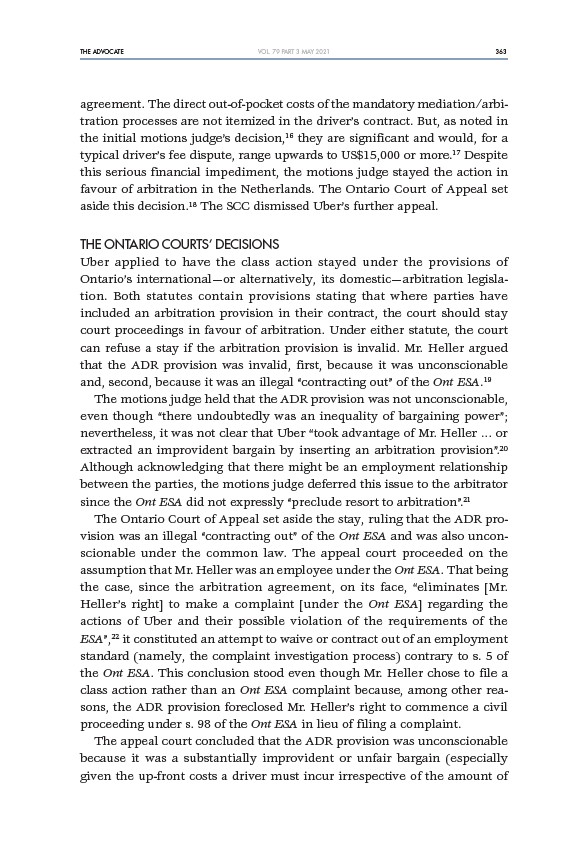
THE ADVOCATE 363
VOL. 79 PART 3 MAY 2021
agreement. The direct out-of-pocket costs of the mandatory mediation/arbitration
processes are not itemized in the driver’s contract. But, as noted in
the initial motions judge’s decision,16 they are significant and would, for a
typical driver’s fee dispute, range upwards to US$15,000 or more.17 Despite
this serious financial impediment, the motions judge stayed the action in
favour of arbitration in the Netherlands. The Ontario Court of Appeal set
aside this decision.18 The SCC dismissed Uber’s further appeal.
THE ONTARIO COURTS’ DECISIONS
Uber applied to have the class action stayed under the provisions of
Ontario’s international—or alternatively, its domestic—arbitration legislation.
Both statutes contain provisions stating that where parties have
included an arbitration provision in their contract, the court should stay
court proceedings in favour of arbitration. Under either statute, the court
can refuse a stay if the arbitration provision is invalid. Mr. Heller argued
that the ADR provision was invalid, first, because it was unconscionable
and, second, because it was an illegal “contracting out” of the Ont ESA.19
The motions judge held that the ADR provision was not unconscionable,
even though “there undoubtedly was an inequality of bargaining power”;
nevertheless, it was not clear that Uber “took advantage of Mr. Heller … or
extracted an improvident bargain by inserting an arbitration provision”.20
Although acknowledging that there might be an employment relationship
between the parties, the motions judge deferred this issue to the arbitrator
since the Ont ESA did not expressly “preclude resort to arbitration”.21
The Ontario Court of Appeal set aside the stay, ruling that the ADR provision
was an illegal “contracting out” of the Ont ESA and was also unconscionable
under the common law. The appeal court proceeded on the
assumption that Mr. Heller was an employee under the Ont ESA. That being
the case, since the arbitration agreement, on its face, “eliminates Mr.
Heller’s right to make a complaint under the Ont ESA regarding the
actions of Uber and their possible violation of the requirements of the
ESA”,22 it constituted an attempt to waive or contract out of an employment
standard (namely, the complaint investigation process) contrary to s. 5 of
the Ont ESA. This conclusion stood even though Mr. Heller chose to file a
class action rather than an Ont ESA complaint because, among other reasons,
the ADR provision foreclosed Mr. Heller’s right to commence a civil
proceeding under s. 98 of the Ont ESA in lieu of filing a complaint.
The appeal court concluded that the ADR provision was unconscionable
because it was a substantially improvident or unfair bargain (especially
given the up-front costs a driver must incur irrespective of the amount of